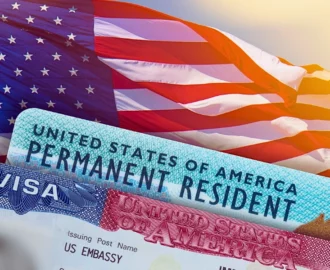Potential clients who are considering tying the knot often ask our family immigration attorneys, “Can a deported person come back legally by marrying a citizen of the United States?”

There are different types of immigration statuses, and individuals can obtain citizenship through a variety of methods. Deported immigrants may be able to re-enter the country by marrying a U.S. citizen through a waiver of inadmissibility. This waiver allows deportees to return to the U.S. early and receive either a green card or immigrant visa.
Typically, it’s difficult for deportees to re-enter the U.S. following initial deportation due to the federal laws in place. They often become “inadmissible,” at which point they would need to spend a certain amount of time outside the country before they’re allowed to return. This process normally takes several years.
Even if an immigrant has married a U.S. citizen and has a green card or immigrant visa, deportation can make it challenging for immigrants to return once deported. However, immigrants may qualify for waivers of admissibility, depending on the circumstances involved in their case.
Why People Get Deported
Regardless of whether a person has a green card or visa, there are certain reasons why the U.S. government may deport him or her. The reasons could include violent or non-violent crimes known as “deportable offenses.” Ultimately, many types of criminal activity could result in deportation, among other consequences.
Immigrants may undergo deportation for some of the following types of offenses.
Aggravated Felonies
These are felonies that are illegal at the federal level, but with the possibility of prosecution under state law. They could include crimes that may count as deportable offenses.
Some examples of aggravated felonies include:
- Drug trafficking
- Murder
- Rape
- Kidnapping
- Racketeering
- Child pornography
Others include treason, sabotage, fraud, tax evasion involving dollar amounts greater than $10,000, and money laundering of $10,000 or more.
Crimes of Moral Turpitude
According to the Merriam-Webster dictionary, moral turpitude involves a certain behavior or act “that gravely violates the sentiment or accepted standard of the community.” The U.S. courts have determined what may qualify as crimes of moral turpitude.
Offenses that the courts have defined as crimes of moral turpitude include:
- Robbery
- Theft
- Mayhem
- Incest
- Spousal or child abuse
- Animal fighting
Controlled Substances
Immigrants may also undergo deportation if they have committed crimes involving controlled substances or drugs. Drug crimes may also warrant the prevention of re-entry once deportation takes place. Drug crimes could include the possession or distribution of drugs. The Immigration and Nationality Act also makes drug addicts or drug abusers deportable in some instances.
Other Circumstances
Other circumstances may also lead to the deportation of immigrants. These may include failure to meet the conditions of their conditional permanent residency, firearm crimes, fraud, inadmissibility at the border, and smuggling.
Ultimately, many types of immigration violations can impact your future in the U.S.
How Long Will a Deported Immigrant Be Inadmissible?
Inadmissibility laws set a specific amount of time when the deportee will be unable to re-enter the U.S. legally following deportation. To better understand how this works, it may be ideal to speak with a deportation lawyer who understands the laws in place regarding inadmissibility.
Specific circumstances may warrant inadmissibility for certain periods of time. For instance, people removed based on their deportability, or who left the country during an outstanding order of removal, will be inadmissible for ten years after leaving the U.S.
Re-Applying for a Visa
Some may wonder how an immigrant becomes a U.S. citizen after deportation. If individuals wish to re-apply for a visa after deportation, they may be able to do so by completing the U.S. Citizenship and Immigration Services (USCIS) Form I-212 Application for Permission to Reapply for Admission into the United States. But not everyone will be able to complete this form and gain reentry into the country. For example, in the majority of cases, convicted felons are unable to re-apply for a visa using this method.
In addition to completing this form, applicants need to submit plenty of paperwork and documentation that helps build their case. These documents may include a record of how long the applicant was lawfully present in the country, their immigration status at the time of their lawful presence, court documents from removal proceedings, and evidence of good moral character.
What Is a Waiver of Inadmissibility?
If someone undergoes deportation for reasons such as unlawful presence in the U.S. or felony convictions, they won’t be able to gain re-entry via Form I-212 alone. They must also apply for a waiver of grounds of inadmissibility that the problem or act created. In these cases, applicants for re-entry need to file USCIS Form I-601, which is the Application for Waiver of Grounds of Inadmissibility. This form may help remove the grounds for removal.
If individuals marry a U.S. citizen, the government will consider them an “immediate relative” in accordance with U.S. immigration laws. Individuals who are married to American citizens may be able to apply for re-entry through a waiver of inadmissibility. But they need to show that there is good reason for the government to waive the grounds for inadmissibility.
Getting Help With Returning to the U.S.

While it’s possible for deportees to gain re-entry into the U.S. if they marry an American citizen, they may still have to apply for re-entry using both Form I-212 and Form I-601. In the process, they need to give the courts good reason why they should be able to re-enter the country following deportation. This is why it’s often best to speak with a family immigration lawyer to discuss the laws in place and the options available regarding re-entry. A family immigration attorney may help with understanding the deportation process and what marriage means for deportees.




